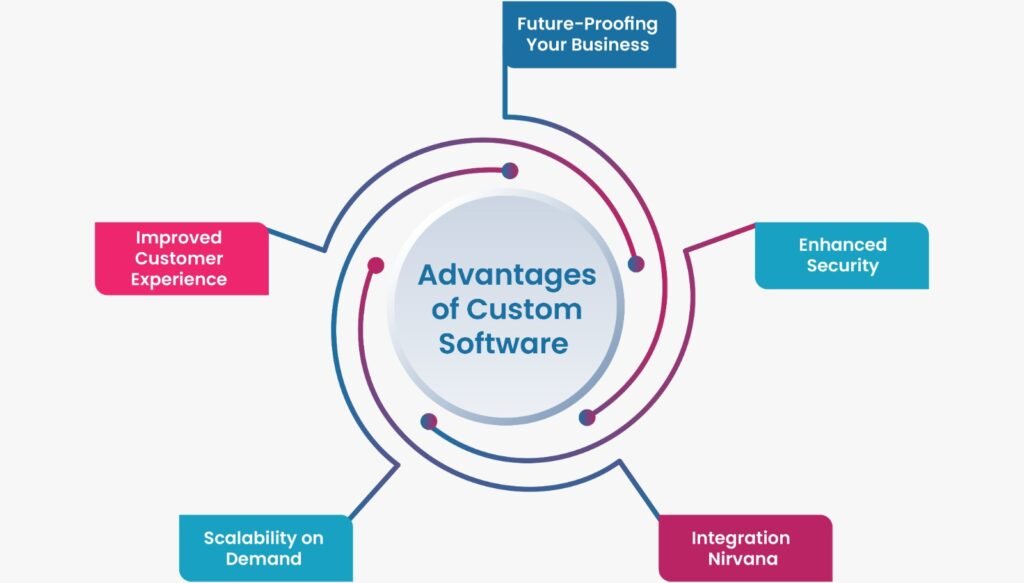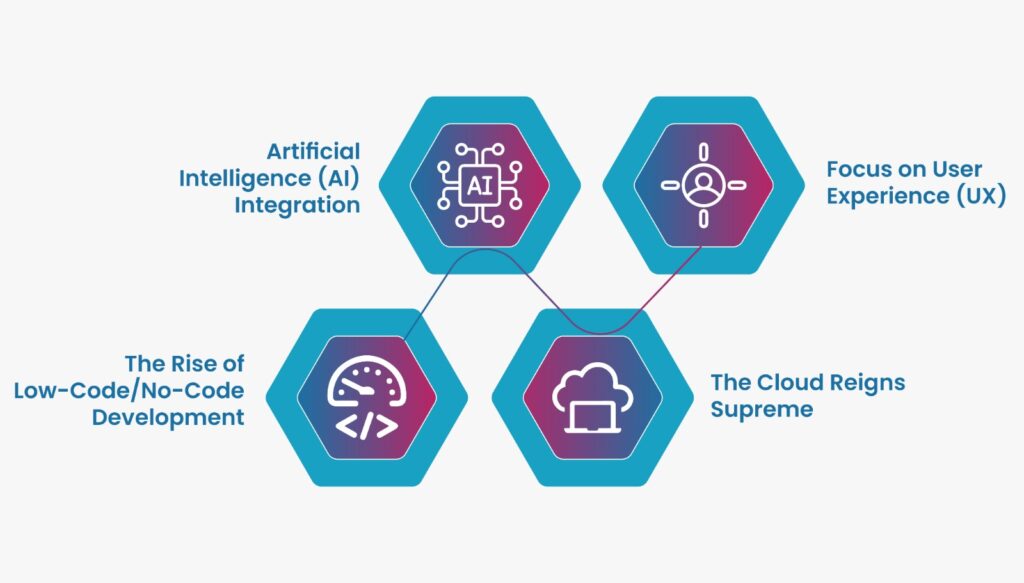
Custom Software Development – Benefits, Trends, and Modern Practices
Imagine a world where your business software doesn’t just function, it anticipates your needs. It remembers your preferences, automates boring tasks, and provides insights that move ahead of the competition. This isn’t a scene from a sci-fi movie; it’s the reality delivered by custom software development.
For years, John’s bakery battled a generic inventory system. Expired ingredients ate into profits, and frustration simmered. The answer? Custom software. It tracked ingredient lifespans, predicted peak orders, and generated automatic purchases. The result: minimized waste, streamlined operations, and a happy John. John’s story is a demonstration of the power of custom software – a competitive edge in a world of generic solutions.
This blog post delves into the world of custom software development, exploring its benefits, the latest trends, and best practices that most blogs neglect to mention. We’ll unveil the secrets behind this dynamic field and equip you to make informed decisions for your business.
What is Custom Software Development?
Custom software development is the process of designing, developing, deploying, and maintaining software applications tailored to meet the specific needs of a business or organization. Unlike off-the-shelf software, which caters to a general audience, custom software is built from the ground up to address your unique challenges and workflows.
The Custom Software Development Process Typically Involves Several Stages:
- Requirement Gathering: This initial phase involves understanding your business objectives, pain points, and target users. Through workshops, interviews, and user research, the development team gathers in-depth information about your needs.
- Planning and Design: Based on the gathered requirements, the team creates a detailed project plan outlining timelines, milestones, and functionalities. User interface (UI) and user experience (UX) mockups are designed to ensure a user-friendly experience.
- Development and Testing: The software built using appropriate programming languages and technologies. Accurate testing conduct throughout the development lifecycle to identify and rectify bugs.
- Deployment and Maintenance: Once thoroughly tested, the software is deployed to your chosen environment (cloud, on-premise, etc.). Ongoing maintenance ensures the software remains functional and secure, and adapts to evolving needs.
Advantages of Custom Software

Custom software development offers a multitude of advantages over off-the-shelf solutions. Here, we explore some of the lesser-discussed benefits:
- Future-Proofing Your Business: Off-the-shelf software evolves at the vendor’s pace, not yours. Custom software can be continuously updated and expanded to accommodate your growing business needs and future technological advancements.
- Enhanced Security: Pre-built software can have hidden security vulnerabilities. Custom software development allows you to prioritize security measures from the very beginning, mitigating risks and protecting sensitive data.
- Integration Nirvana: Custom software seamlessly integrates with your existing business tools and systems, eliminating data silos and streamlining workflows.
- Scalability on Demand: Custom software scales effortlessly alongside your business. Whether you need to accommodate increased user traffic or manage a growing data volume, custom software can adapt.
- Improved Customer Experience: Tailored software empowers you to create a user experience that resonates with your specific customer base. This translates to higher customer satisfaction, increased loyalty, and a competitive advantage.
Custom Software Development Trends in 2024

The landscape of custom software development is constantly evolving. Here are some key trends shaping the industry in 2024:
- The Rise of Low-Code/No-Code Development: These platforms empower citizen developers (individuals within a business with limited coding experience) to build simple applications. This democratizes software development and allows businesses to address smaller needs internally.
- Artificial Intelligence (AI) Integration: Custom software is increasingly incorporating AI functionalities like machine learning and natural language processing. This enables features like predictive analytics, chatbots, and intelligent automation.
- The Cloud Reigns Supreme: Cloud-based custom software development company offers scalability, flexibility, and cost-effectiveness. Businesses are increasingly opting for cloud-based solutions for faster deployment and easier maintenance.
- Focus on User Experience (UX): In a world saturated with applications, user experience is paramount. Custom software development services provider prioritizes intuitive interfaces(UI/UX), clear navigation, and a learning curve that feels like a gentle slope, not a sheer cliff face.
Modern Practices in Custom Software Development: Unveiling the Secrets

While the core principles of custom software development remain constant, the methodologies employed are constantly being refined. Here, we explore some best practices that are often overlooked:
- Agile Development: This iterative approach breaks down the development process into smaller, manageable sprints. This allows for continuous feedback and adaptation throughout the project lifecycle, ensuring the final product aligns perfectly with your evolving needs.
- DevOps Adoption: DevOps bridges the gap between development (Dev) and operations (Ops) teams, fostering collaboration and streamlining the software development lifecycle. This results in faster deployments, fewer errors, and a more efficient development process.
- Data-Driven Decisions: Data is the lifeblood of modern software development. Leveraging analytics to understand user behavior, identify inefficiencies, and track key performance indicators (KPIs) allows for data-driven decision-making throughout the development process.
- Prioritizing Security: Security considerations are lacking in the fabric of custom software development from the very beginning. Employing secure coding practices, penetration testing, and robust authentication measures ensures your software is safe from cyber threats.
- Embracing Continuous Integration and Delivery (CI/CD): This practice automates the testing, building, and deployment of software. By automating these processes, developers can release updates faster, reduce errors, and ensure a more consistent development workflow.
Beyond the Code: The Often-Ignored Aspects of Custom Software Development
While the technical aspects of custom software development are crucial, success hinges on several less-discussed factors:
- Understanding Your Business: A successful custom software development project starts with a deep understanding of your business goals, challenges, and target audience. The development team should become an extension of your own, working collaboratively to translate your vision into reality.
- Communication is Key: Open and transparent communication is paramount throughout the development process. Regular meetings, progress reports, and user feedback sessions ensure everyone is on the same page and the final product meets your expectations.
- Embrace Change: The business landscape is constantly evolving. Custom software is design with flexibility in mind. Regular maintenance and updates are essential to ensure your software remains relevant and adapts to changing market demands.
Conclusion:
In today’s competitive business environment, custom software development company offers a powerful path to success. By understanding your specific needs, leveraging the latest trends, and adopting modern practices, you can unlock a world of possibilities. Custom software isn’t just about functionality; it’s about empowering your business to thrive in the ever-evolving digital landscape.
Ready to Start Your Custom Software Development Journey?
Partner with a reputable software development company that possesses the expertise, experience, and commitment to excellence. CodePerk Solutions can help you craft a software solution that grow your business to new heights.
